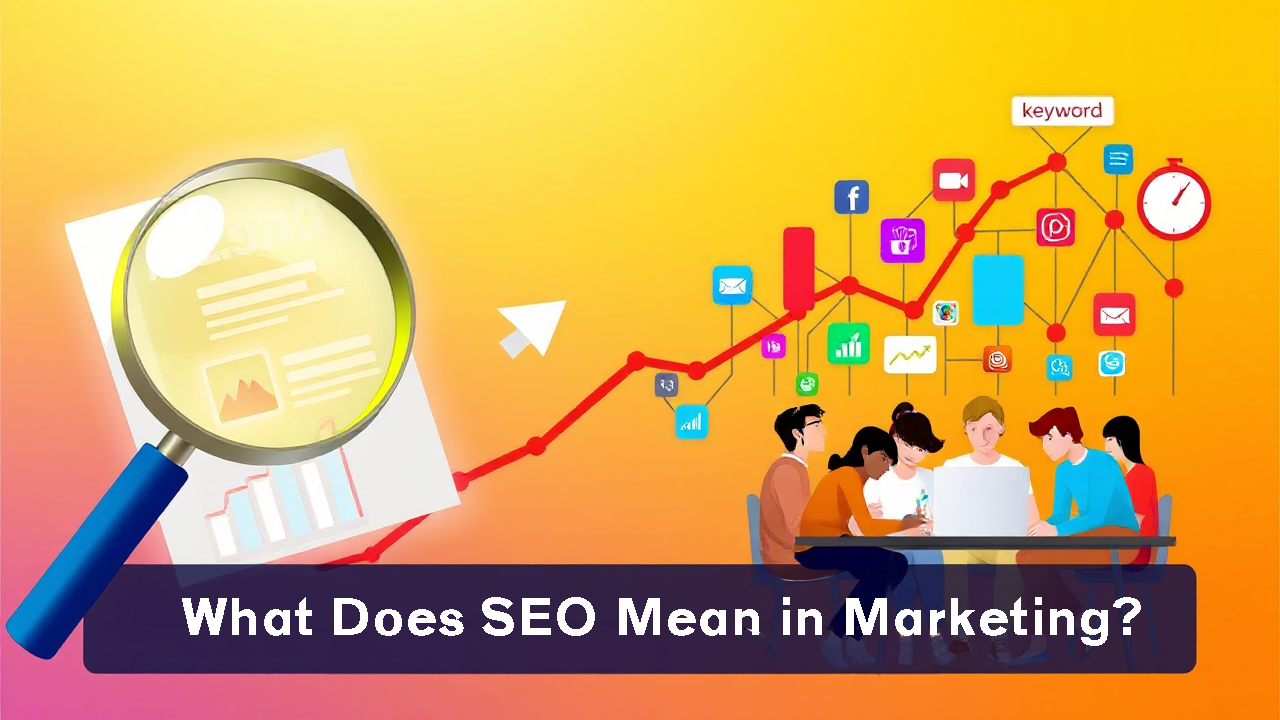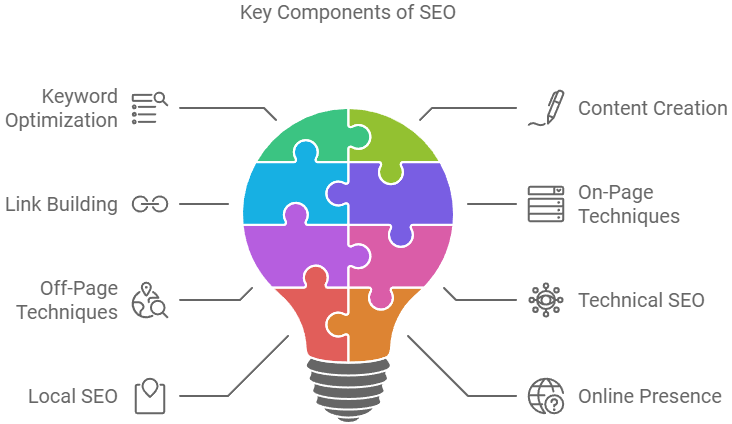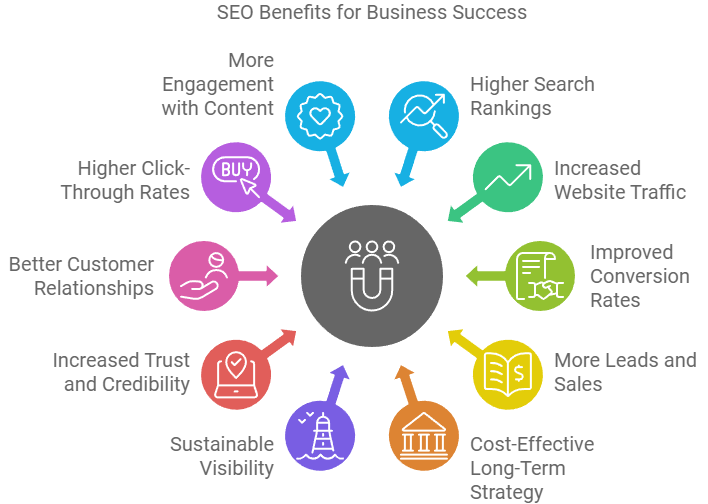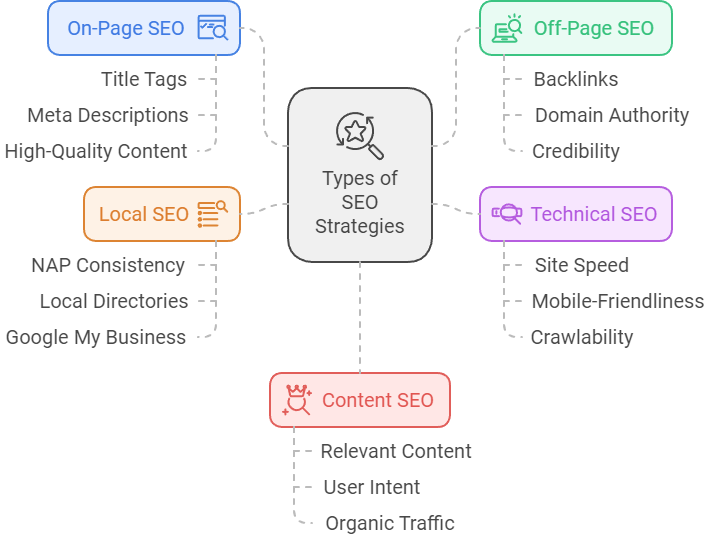What Does SEO Mean in Marketing?
September 1st, 2024

SEO, or Search Engine Optimization, is essential for effective marketing because it helps your website appear higher in search results, drawing in organic traffic. By optimizing keywords, creating quality content, and ensuring a user-friendly site layout, you increase your chances of being seen by potential customers. SEO also builds trust, as high-ranking sites are often viewed as credible. Key strategies include on-page, off-page, and technical SEO. Regularly updating content and using analytics tools keep your strategy fresh and relevant. Mastering these elements can greatly enhance your marketing efforts and lead to better user engagement. There's plenty more to explore!
What Is SEO?
SEO, or Search Engine Optimization, is essential for boosting your website's visibility in search engine results pages (SERPs).
It's a key practice for attracting organic traffic, which is the visitors who find your site through unpaid search results.

To effectively implement SEO, you need to focus on three main areas: on-page, off-page, and technical techniques.
Effective local SEO and online presence strategies also play a vital role in enhancing your site's visibility and driving relevant traffic.
- Keyword Optimization: This involves researching and using the right keywords that your audience is searching for. It helps search engines understand what your content is about.
- Content Creation: Quality content is vital. You should create engaging and informative articles that align with user intent, answering questions your audience has.
- Link Building: This strategy involves getting other websites to link back to yours. It builds authority and credibility, boosting your site's ranking.
Importance of SEO in Marketing
Understanding the importance of SEO in marketing is essential for your business success.
By improving your website's visibility, you can attract more visitors without spending a fortune on ads.
As digital marketing strategies continue to evolve, effective SEO not only generates cost-effective traffic but also keeps your site relevant over time, leading to better overall sales.

Increased Website Visibility
Increasing your website's visibility is vital for driving organic traffic and attracting potential customers. When you optimize your content with SEO, you improve your chances of ranking higher in search engine results pages (SERPs).
This is significant because nearly 59% of shoppers use Google to research products before making a purchase. To achieve effective marketing, it's important to focus on strategic content marketing efforts that enhance your online presence and authority.
Here's how you can boost your website visibility:
- Use Relevant Keywords: Identify and incorporate keywords that your target audience is searching for.
- Optimize Your Content: Create high-quality content that answers questions and provides value. This keeps visitors engaged and encourages them to share your site.
- Improve Site Structure: Make certain your website is easy to navigate. A well-structured site helps both users and search engines find information quickly.
Cost-Effective Traffic Generation
How can businesses attract consistent traffic without breaking the bank? The answer lies in SEO. This cost-effective strategy focuses on driving organic traffic to your website, which accounts for 53% of all website visits. By optimizing your site for search engines, you gain sustainable visibility and long-term benefits compared to paid ads that stop once your budget runs out.
Here's a quick overview of why SEO is essential for traffic generation:
| Benefits of SEO | Impact on Your Business |
|---|---|
| Higher search rankings | Increased website traffic |
| Improved conversion rates | More leads and sales |
| Cost-effective long-term strategy | Sustainable visibility without ongoing costs |
| Increased trust and credibility | Better customer relationships |
| Higher click-through rates | More engagement with your content |
Key Components of SEO
SEO consistently plays an essential role in effective marketing strategies, combining various components that work together to enhance a website's visibility. Understanding these key components can help you improve your site's performance in search engines. Here are three important aspects to focus on:
- Technical SEO: This involves optimizing your website's architecture. You need to guarantee it's crawlable and indexable, which includes improving site speed, mobile-friendliness, and using structured data.
- On-page SEO: Optimize each web page with relevant keywords, high-quality content, meta tags, and a clear URL structure. This helps improve relevance and user engagement, aligning with search intent.
- Off-page SEO: Build backlinks from reputable sites to enhance your website's authority. This is essential for improving your search rankings and establishing credibility.
Additionally, don't overlook content SEO, which focuses on creating valuable, relevant content, and local SEO, which makes certain your business appears in local searches by maintaining consistent Name, Address, and Phone information.
Understanding Search Engine Algorithms
To succeed in SEO, you need to understand how search engine algorithms rank your content.
These algorithms look at factors like keyword use and how well your content matches what users are searching for.
Algorithm Ranking Factors
Search engines' complex algorithms play a significant role in determining how web pages rank for specific queries. These algorithms analyze over 200 algorithm ranking factors to decide which pages are most relevant.
To improve your search engine optimization (SEO), focus on these key areas:
- Content Quality: Always create valuable and informative content that keeps users engaged.
- Keyword Relevance: Use keywords that match what your audience is searching for.
- User Experience: Make certain that your website is easy to navigate and visually appealing.
Additionally, don't forget about technical SEO. A well-structured URL and a clear site architecture help search engines crawl and index your site effectively.
Fresh content is essential too; regularly updating your pages keeps them relevant and satisfying to users.
User Intent Interpretation
Understanding how algorithms rank pages is just the beginning; you also need to grasp user intent interpretation. This means figuring out what people really want when they search online.
Search engines categorize queries based on user intent, which can be informational, navigational, transactional, or commercial.
To satisfy user intent, focus on these key areas:
- Keyword Relevance: Use keywords that match what your audience is searching for. This helps search engines understand your content better.
- Content Quality: Create high-quality content that answers users' questions. The more relevant your content is, the more likely it's to rank well.
- User Engagement: Monitor how users interact with your content. High engagement signals to search engines that your content is valuable.
Types of SEO Strategies
Five main types of SEO strategies can greatly enhance your online presence and drive traffic to your website.
Understanding these strategies helps you implement an effective SEO plan that leads to better organic results.

Here's a quick overview:
- On-Page SEO: This involves optimizing individual web pages. You'll focus on title tags, meta descriptions, and high-quality content to improve visibility in search engine results.
- Off-Page SEO: This strategy emphasizes building backlinks from authoritative sites. By doing this, you boost your domain authority and credibility, which is essential for better search rankings.
- Technical SEO: Ensuring your website's architecture is sound is key. This includes optimizing site speed, mobile-friendliness, and crawlability, all of which improve indexing and user experience.
- Local SEO: If you're targeting local customers, you need to maintain consistent NAP (Name, Address, Phone) information and optimize your listings on local directories like Google My Business.
- Content SEO: Focus on creating high-quality, relevant content that meets user intent. This can lead to improved rankings and increased organic traffic.
Implementing these strategies can set you on the path to SEO success!
On-Page and Off-Page SEO
To improve your website's visibility, you'll want to focus on both On-Page and Off-Page SEO techniques.
For On-Page SEO, prioritize quality content, strategic keyword usage, and effective title tags to keep users engaged.
Meanwhile, building quality backlinks from trusted sites will boost your domain authority and help you rank higher in search results.
On-Page Optimization Techniques
On-page optimization techniques are vital for boosting your website's visibility in search engine results. These techniques help search engines understand your content better and match it with what users are looking for.
Here are three key on-page SEO practices you should focus on:
- Keyword Optimization: Make sure to naturally include targeted keywords in your headings, content, and image alt text. This aligns your content with user search intent and improves relevance.
- Content Quality: Always prioritize high-quality content. Engaging and informative content keeps users on your page longer, which can positively impact your rankings.
- URL Structure: Create a descriptive and keyword-rich URL structure. This not only helps search engines understand your content but also makes it easier for users to navigate your site.
Additionally, regular content updates are essential. Keeping your content fresh demonstrates to search engines that your information is current and valuable.
Remember, while backlinks are important for off-page SEO, focusing on these on-page techniques can greatly enhance your site's performance in search results.
Start optimizing today and watch your visibility grow!
Building Quality Backlinks
Building quality backlinks is one of the most effective ways to enhance your website's authority and improve its search engine rankings. Backlinks are links from other websites to yours, and they play an essential role in off-page SEO. They boost your domain authority and credibility, which helps drive organic traffic to your site.
Here are some key strategies to build quality backlinks:
- Engage in Outreach: Connect with other bloggers or websites in your niche. Guest blogging and collaborations can yield high-quality backlinks while strengthening relationships in your industry.
- Internal Linking: Don't forget to link to reputable sites within your content. This not only aids in on-page SEO but also improves site navigation and user engagement.
- Analyze Your Backlink Profile: Use tools like Ahrefs or SEMrush to regularly check your backlinks. Identify any toxic links that could hurt your reputation and adjust your link-building strategy accordingly.
- Work with Your Content Team: Make certain your content is valuable and shareable, making it more likely to earn backlinks.
Technical SEO Essentials
Focusing on the technical aspects of SEO is vital for guaranteeing your website stands out in search engine results.
When you optimize your website architecture, you improve search engine visibility. Here are three key areas to concentrate on:
- Site Speed: Fast-loading pages keep users happy and reduce bounce rates. Make certain to optimize images and minimize code for quicker loading times.
- Mobile-Friendliness: With more users accessing websites on their phones, a responsive design is vital. Guarantee your site adapts well to different screen sizes for a better user experience.
- URL Structure: A clear and logical URL structure makes it easier for search engines to crawl and index your pages. Keep URLs short, relevant, and descriptive.
SEO Best Practices
Effective SEO best practices are essential for enhancing your website's visibility and driving organic traffic. To get started, focus on these key areas:
| Best Practice | Description |
|---|---|
| Keyword Research | Identify terms that match user intent to improve content relevance. |
| Content Quality | Regularly create engaging and original content to attract website visitors and signal value to search engines. |
| Backlink Building | Develop a strong backlink profile from reputable sources to enhance domain authority. |
| Website Structure | Optimize your site for easy navigation and indexing, helping search engines crawl efficiently. |
Measuring SEO Success
To truly understand how your SEO efforts are performing, you need to measure success through key performance indicators (KPIs). These metrics will help you determine the effectiveness of your SEO strategies.
Here are three important KPIs to track:
- Organic Traffic: This shows how many visitors come to your site from search engines. An increase indicates that your SEO tactics are working.
- Keyword Performance: Keep an eye on how well your targeted keywords rank in search results. Higher rankings typically lead to more clicks.
- Backlinks: Monitoring the number and quality of backlinks to your site is essential. Good backlinks enhance your authority and improve your search rankings.
Also, don't forget to assess user engagement and conversion rates. A low bounce rate and high conversion rate suggest your content resonates with visitors.
Use tools like Google Analytics and Google Search Console to gather insights on these KPIs. Regularly analyze this data to understand what's working and what needs adjustment.
Future Trends in SEO
As we look ahead, five key trends are reshaping the SEO landscape and influencing how marketers approach their strategies.
- Voice Search: With smart speakers becoming common, optimizing for conversational keywords is fundamental for search engine optimization (SEO).
- User Experience: Google's Core Web Vitals are now essential. Guarantee your site loads quickly, is interactive, and visually stable. A positive user experience boosts engagement and rankings.
- AI and Content Needs: As AI improves, search engines understand user intent better. Focus on creating high-quality, relevant content that meets these evolving needs.
- Video SEO: Video content is on the rise, expected to account for 82% of internet traffic. Optimize your video content to capture attention and improve search rankings.
- Local SEO: With 76% of people visiting local businesses after searching, enhancing your Google My Business listing is imperative.
Use localized content to connect with your community.
Frequently Asked Questions
What Does SEO Mean in Marketing?
In marketing, SEO basics involve keyword research, on-page optimization, and link building. You'll enhance your content strategy through technical SEO and improve user experience, driving more traffic and potential customers to your website.
Why Is SEO Important for Marketing?
SEO's essential for marketing because it boosts your website visibility through keyword research and content optimization. By understanding search algorithms and enhancing user experience, you can attract organic traffic and outperform competitors with effective competitive analysis.
What Is SEO Effectiveness?
SEO effectiveness hinges on how well you leverage SEO metrics, tools, and analytics. By staying updated on trends and overcoming challenges, you can optimize your content to enhance visibility and drive traffic to your site.
What Are SEO Strategies in Marketing?
To boost your marketing, focus on keyword research, content optimization, and backlink building. Don't forget technical SEO and mobile optimization to enhance user experience, while local SEO targets customers in your area effectively.
Final Thoughts
In conclusion, understanding SEO is essential for successful marketing. It helps your website get noticed and attract visitors. By focusing on key components like keywords, technical SEO, and best practices, you can improve your search ranking. Regularly measuring your success will show you what works and what doesn't. As SEO trends evolve, stay informed to keep your strategy effective. Remember, investing time in SEO now can lead to big rewards for your business in the future.